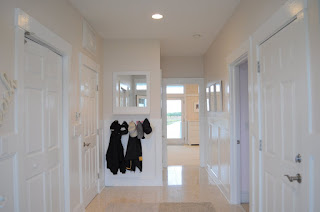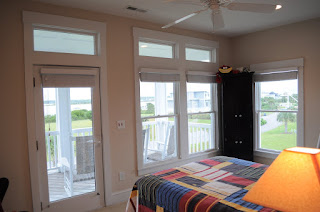NationalJournal.com - The Cook Report: The Home Front - Friday, June 3, 2011 The Cook Report: The Home Front
Despite the housing slump, Americans of all political persuasions have a visceral desire to own their own home.
Updated: June 3, 2011 | 9:45 a.m.
June 2, 2011 | 5:00 p.m.

Justin Sullivan/Getty Images
Slow growth: The housing sector is weighing down the recovery.
Last week’s confirmation that the gross domestic product grew only 1.8 percent in the first quarter came when economists were already busily revising their growth forecasts downward for the rest of this year. A double-dip recession remains unlikely, but this is the weakest recovery since the Great Depression and the first one not being led by housing. The nearly moribund housing sector is, in fact, weighing down the recovery.
The conundrum is very real. On the one hand, the subprime-mortgage crisis and easy money—loans with minimal down payments and scant documentation—brought the U.S. economy to its knees just three years ago. Clearly, changes had to be made to prevent that from recurring. On the other hand, housing-industry leaders now fear that the pendulum is swinging too far the other way, potentially decimating an already battered sector and further stifling the anemic recovery. Although we hear the perennial debate over limiting the homeowners’ mortgage-interest deduction, which would hurt the middle and higher end of the housing market, other proposed regulations really terrify the industry. These rules include increased down-payment requirements and loan restrictions for all but those with near-bulletproof credit ratings.
A bipartisan national poll of 2,000 likely voters to be released next week by the National Association of Home Builders makes clear the unique position that homeownership holds in Americans’ minds and the delicacy required in dealing with the issue.
The May 3-9 telephone survey, conducted by Celinda Lake and Jonathan Voss of the Democratic polling firm Lake Research Partners and by Neil Newhouse and Robert Blizzard of the GOP outfit Public Opinion Strategies, found that 75 percent of voters believe “that owning a home is the best long-term investment they can make and is worth the risk of ups and downs in the housing market.”
Interestingly, a high percentage of people in different financial situations felt this way, including 81 percent of those who own their homes outright, 76 percent with mortgages, 67 percent who are renters, and 65 percent with underwater mortgages. Respondents were also asked whether they would recommend buying a house to a close friend or family member just starting out. Eighty percent of all voters said yes, including 78 percent who had underwater mortgages. Seventy-three percent of the respondents who do not own a home said that their goal is to eventually buy one. Clearly, the decline in home values and economic turmoil have not diluted their dream of homeownership and the aspirational element that makes the notion a core value.
Some have suggested that the government end tax incentives for homeowners, but the survey suggests a hostile voter reaction to that plan. Told that “since the federal income tax was introduced in 1913, the federal government has used the tax code to encourage homeownership,” respondents were then asked: “In general, do you think it is appropriate and reasonable for the federal government to provide tax incentives to promote homeownership, or do you think it is not a good idea?” Seventy-three percent of all voters thought those incentives should be provided, including 71 percent of Republicans, 68 percent of independents, 79 percent of Democrats, and even 68 percent of those who support the tea party movement.
When asked about requiring a 20 percent down payment to purchase a home, respondents split evenly, with 49 percent supporting such a threshold and 49 percent opposing it. But among those most likely to be affected, mortgage holders and renters ages 18 to 54, opposition was strong, with 58 percent of younger mortgage holders and 59 percent of younger renters opposed to adding that hurdle to buying a home.
Given this kind of visceral connection to homeownership, it’s not surprising that 71 percent of respondents oppose eliminating the mortgage-interest deduction and 63 percent oppose lowering it. Moreover, 58 percent oppose eliminating the deduction for home-equity loans or limiting the deduction for those who earn more than $250,000 a year. Fifty-seven percent of voters said they would be less likely to support a candidate for Congress who wanted to eliminate the mortgage-interest deduction; only 26 percent said they would be more likely to support such a candidate.
These numbers are pretty much across the board: Sixty-three percent of Republicans, 56 percent of independents, 55 percent of Democrats, 61 percent of tea party supporters, and 58 percent of those voters in congressional districts held by freshman Republicans would be less likely to support a candidate who favored killing the deduction. With the unusually large sample, the pollsters segmented respondents who live in congressional districts that The Cook Political Report rates in the swing category. Fifty-eight percent of that group were less likely to support such a candidate, with 56 percent of those voters in swing Senate states and 54 percent in states that The Washington Post’s Chris Cillizza rates as swing presidential states.
The clear message is that owning a home is among the values that Americans most cherish—an important part of the American Dream.























